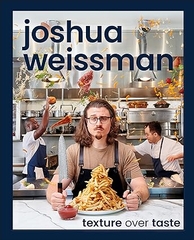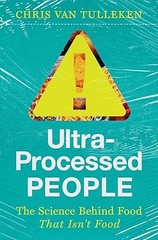-
-
-
Tổng tiền thanh toán:
-
-
Thông tin
-
Tìm sách theo yêu cầu
This well-researched, thought-provoking guide to traditional foods contains a startling message: Animal fats and cholesterol are not villains but vital factors in the diet, necessary for normal growth, proper function of the brain and nervous system, protection from disease and optimum energy levels. Sally Fallon dispels the myths of the current low-fat fad in this practical, entertaining guide to a can-do diet that is both nutritious and delicious.
Nourishing Traditions will tell you:
- Why your body needs old fashioned animal fats
- Why butter is a health food
- How high-cholesterol diets promote good health
- How saturated fats protect the heart
- How rich sauces help you digest and assimilate your food
- Why grains and legumes need special preparation to provide optimum benefits
- About enzyme-enhanced food and beverages that can provide increased energy and vitality
- Why high-fiber, lowfat diets can cause vitamin and mineral deficiencies
Topics include the health benefits of traditional fats and oils (including butter and coconut oil); dangers of vegetarianism; problems with modern soy foods; health benefits of sauces and gravies; proper preparation of whole grain products; pros and cons of milk consumption; easy-to-prepare enzyme enriched condiments and beverages; and appropriate diets for babies and children.
Product Details
Paperback: 688 pages
- Publisher: Newtrends Publishing, Inc.; Revised and Updated 2nd edition (April 8, 2003)
- Language: English
- ISBN-10: 0967089735
- ISBN-13: 978-0967089737
- Product Dimensions: 10.1 x 7.5 x 1.4 inches
- Shipping Weight: 2.8 pounds (View shipping rates and policies)
- Average Customer Review: 4.6 out of 5 stars See all reviews (1,111 customer reviews)
- Amazon Best Sellers Rank: #500 in Books (See Top 100 in Books)
- #22 in Books > Cookbooks, Food & Wine > Special Diet
- #23 in Books > Health, Fitness & Dieting > Diets & Weight Loss > Other Diets
Editorial Reviews
Review
"I have to recommend . . . Nourishing Traditions by Sally Fallon. The first chapter of her book is so right on target that I feel a little guilty for taking her ideas." — Robert C. Atkins, MD
From the Back Cover
The Diet Dictocrats don't want you to know that...
Your body needs old-fashioned animal fats New-fangled polyunsaturated oils can be bad for you Modern whole grain products can cause health problems Traditional sauces promote digestion and assimilation Modern food processing denatures our foods but Ancient preservation methods actually increase nutrients in fruits, nuts vegetables, meats and milk products!
At last a successful challenge to Politically Correct Nutrition and the Diet Dictocrats!
Recalling the culinary customs of our ancestors, and looking ahead to a future of robust good health for young and old, Nourishing Traditions offers modern families a fascinating guide to wise food choices and proper preparation techniques. Sally Fallon unites the wisdom of the ancients with the latest independent and accurate scientific research in over 700 delicious recipes that will please both exacting gourmets and busy parents. --This text refers to an out of print or unavailable edition of this title.
Most Helpful Customer Reviews
1,463 of 1,509 people found the following review helpfulBy A Customer on March 18, 2002
Format: Paperback Verified Purchase
17 Comments Was this review helpful to you? YesNoI was seeing references to this book in other books that I found helpful: The Metabolic Typing Diet and Life Without Bread. But I delayed more than a year before buying Nourishing Traditions. I figured if I knew what to eat, I didn't need a cookbook too.
I was wrong. This is a textbook as much as a cookbook. I liken it to Joy of Cooking. You can learn a lot from it about food and nutrition even if you never use its recipes. I have used recipes from both, though, and can attest to their deliciousness. But I must admit, for me the best thing about reading Nourishing Traditions is learning about nutrition, not learning new recipes.
The authors criticize the "Diet Dictocrats" who propound the "politically correct" low-fat, low-cholesterol diet. I find the epithet of "politically correct" rather grating and would hope they drop it in later editions.
The book's thesis is a Rousseauian one: industrial food production yields a product unsuited to our body's nature. To find out what is suited to our nature, we ought to rely on research of what preindustrial societies consumed. Thus, as another reviewer pointed out, they view themselves as continuators of the program initiated by the dentist Weston Price (author of Nutrition and Physical Degeneration).
I had spent years eating in accordance with the low-fat dietary dogma and my health suffered because of it. I give the authors credit for recognizing a wide spectrum of ideal diets depending on one's genetic makeup. What is more problematic is how one draws the line between natural and unnatural. Is the line to be drawn between industrial and nonindustrial societies, or is it more basic than that? The book NeanderThin, for example sees humanity making a wrong turn with the advent of civilization. Civilization brings cultivation of grain and the domestication of dairy animals. Nourishing Traditions embraces dairy and grain as long as they are prepared in ways consistent with nonindustrial societies.
Despite these controversies, Nourishing Traditions is a treasure trove of valuable information. Just one small tidbit: there is a concern that beef in the USA has an unfavorable fat profile--there is an unsatisfactory omega 6/omega 3 fatty acid ratio. I just learned from Nourishing Traditions that this problem is not present with lamb in the USA because lamb is virtually all pasture-raised. Since I live in a small apartment and have no place to hang a side of pasture-fed beef, this was very helpful information.
OK, OK, one more tidbit. Everyone by now should know that people who eat nuts live longer. I love the taste of nuts but they always were hard for me to digest. Nourishing Traditions explains why and told me how to eat nuts without the digestive upset. These people know their stuff.
I've seen five stars on a lot of books, that were, frankly, pretty lightweight. This book is a keeper. It's not someone's brilliant marketing concept turned into a book. It's clearly the product of much, much, hard work. It's not the final word. But it's a comprehensive presentation of a coherent worldview on healthy nutrition.
I was wrong. This is a textbook as much as a cookbook. I liken it to Joy of Cooking. You can learn a lot from it about food and nutrition even if you never use its recipes. I have used recipes from both, though, and can attest to their deliciousness. But I must admit, for me the best thing about reading Nourishing Traditions is learning about nutrition, not learning new recipes.
The authors criticize the "Diet Dictocrats" who propound the "politically correct" low-fat, low-cholesterol diet. I find the epithet of "politically correct" rather grating and would hope they drop it in later editions.
The book's thesis is a Rousseauian one: industrial food production yields a product unsuited to our body's nature. To find out what is suited to our nature, we ought to rely on research of what preindustrial societies consumed. Thus, as another reviewer pointed out, they view themselves as continuators of the program initiated by the dentist Weston Price (author of Nutrition and Physical Degeneration).
I had spent years eating in accordance with the low-fat dietary dogma and my health suffered because of it. I give the authors credit for recognizing a wide spectrum of ideal diets depending on one's genetic makeup. What is more problematic is how one draws the line between natural and unnatural. Is the line to be drawn between industrial and nonindustrial societies, or is it more basic than that? The book NeanderThin, for example sees humanity making a wrong turn with the advent of civilization. Civilization brings cultivation of grain and the domestication of dairy animals. Nourishing Traditions embraces dairy and grain as long as they are prepared in ways consistent with nonindustrial societies.
Despite these controversies, Nourishing Traditions is a treasure trove of valuable information. Just one small tidbit: there is a concern that beef in the USA has an unfavorable fat profile--there is an unsatisfactory omega 6/omega 3 fatty acid ratio. I just learned from Nourishing Traditions that this problem is not present with lamb in the USA because lamb is virtually all pasture-raised. Since I live in a small apartment and have no place to hang a side of pasture-fed beef, this was very helpful information.
OK, OK, one more tidbit. Everyone by now should know that people who eat nuts live longer. I love the taste of nuts but they always were hard for me to digest. Nourishing Traditions explains why and told me how to eat nuts without the digestive upset. These people know their stuff.
I've seen five stars on a lot of books, that were, frankly, pretty lightweight. This book is a keeper. It's not someone's brilliant marketing concept turned into a book. It's clearly the product of much, much, hard work. It's not the final word. But it's a comprehensive presentation of a coherent worldview on healthy nutrition.
393 of 408 people found the following review helpfulBy Beach Bum Bob on August 6, 2007
Format: Paperback
The 'most helpful' review for this book here at Amazon questions the reliance by this book on Dr. Weston Price's work, simply because he was a dentist. Fair enough, but the smart thing would be to see what he said for yourself. Instead of relying on Sally Fallon's word for why Dr. Price's work was so important, I went and read his book, Nutrition and Physical Degeneration, myself. I actually checked out one printed in the 1940's from a university library, to avoid any reprint changes he may or may not have approved.
His work is fascinating. He first sought to understand why isolated people on traditional, unprocessed diets had such remarkable teeth, dental arches, and resistance to disease, particulary tuberculosis. Instead of focusing on the traditional methods used in medicine that seek to cure medical problems after the fact, he was out to find out a way to prevent the problems in the first place. What a novel idea. What he discovered was that traditional diets of isolated peoples maintained the teeth and health of these people in a dramatic fashion. He also found that within a generation of being exposed to processed food diets, these people began to experience the same health problems we have now. Why rely on his work, which dates some 70 years old? Because this same research can't be done today, there just aren't enough people that are still untouched by civilizaton and processed diets.
Back to this book. I believe much of what Sally Fallon has to say is right on the money. She was wise to heavily rely on what Dr. Price found and then has provided much additional information and some good recipies to go along with it. I agree with some of the other reviews here that state that implementing much of what she suggests into your diet will be a challenge. Our society and the giant food manufacturers have made it so, because that's how they earn a profit. Any way you slice it, eating healthy is a lot more work for you individually because you have to rely on yourself to prepare fresh unprocessed foods. But it's worth doing, and if you take bits and pieces and start to implement them gradually you and your family (and your future offspring) will be much better off because of it.
- Link: http://www.amazon.com/Nourishing-Traditions-Challenges-Politically-Dictocrats/dp/0967089735
His work is fascinating. He first sought to understand why isolated people on traditional, unprocessed diets had such remarkable teeth, dental arches, and resistance to disease, particulary tuberculosis. Instead of focusing on the traditional methods used in medicine that seek to cure medical problems after the fact, he was out to find out a way to prevent the problems in the first place. What a novel idea. What he discovered was that traditional diets of isolated peoples maintained the teeth and health of these people in a dramatic fashion. He also found that within a generation of being exposed to processed food diets, these people began to experience the same health problems we have now. Why rely on his work, which dates some 70 years old? Because this same research can't be done today, there just aren't enough people that are still untouched by civilizaton and processed diets.
Back to this book. I believe much of what Sally Fallon has to say is right on the money. She was wise to heavily rely on what Dr. Price found and then has provided much additional information and some good recipies to go along with it. I agree with some of the other reviews here that state that implementing much of what she suggests into your diet will be a challenge. Our society and the giant food manufacturers have made it so, because that's how they earn a profit. Any way you slice it, eating healthy is a lot more work for you individually because you have to rely on yourself to prepare fresh unprocessed foods. But it's worth doing, and if you take bits and pieces and start to implement them gradually you and your family (and your future offspring) will be much better off because of it.
XEM CHI TIẾT TẠI AMAZON.COM
- Thông tin chi tiết
- Mục lục
- Đánh giá & bình luận của người mua
- Những cuốn sách cùng chủ đề hoặc có liên quan
Tại web chỉ có một phần nhỏ các đầu sách đang có nên nếu cần tìm sách gì các bạn có thể liên hệ trực tiếp với Thư viện qua Mail, Zalo, Fanpage nhé
Đăng ký nhận tin qua email
Hãy đăng ký ngay hôm nay để nhận được những tin tức cập nhật mới nhất về sản phẩm và các chương trình giảm giá, khuyến mại của chúng tôi.












